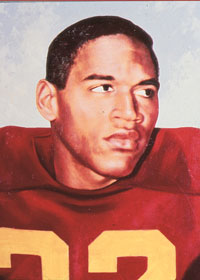Understanding Who OJ is: A Legacy in Sports and Entertainment

Introduction
Orenthal James Simpson, commonly known as OJ, remains a significant figure in American culture, both as a celebrated athlete and a controversial public figure. His fame as an NFL star and his subsequent notoriety from high-profile legal battles continue to captivate the public’s attention. Understanding who OJ is provides insight into many cultural and societal issues that resonate today.
A Glorious Athletic Career
Born on July 9, 1947, in San Francisco, California, OJ Simpson initially gained widespread acclaim as a college football player at the University of Southern California (USC), where he won the Heisman Trophy in 1968. Following this success, he was drafted as the first overall pick by the Buffalo Bills in the 1969 NFL Draft. During his professional career, Simpson broke numerous records, including being the first player to rush for over 2,000 yards in a single season in 1973. His speed and agility on the field earned him the nickname ‘The Juice’ and a place in the Pro Football Hall of Fame in 1985.
Beyond Sports: A Hollywood Career
Simpson’s star power transcended sports; he appeared in numerous films and television shows, including the popular Police Squad! series and the Naked Gun film franchise. His charisma and charm made him a household name, leading to a successful career in acting, and he even became a television sportscaster after his retirement from football.
Controversy and Legal Battles
Despite his achievements, OJ’s life took a dramatic turn in the 1990s. In June 1994, he found himself at the centre of a media frenzy following the murders of his ex-wife Nicole Brown Simpson and her friend Ron Goldman. The subsequent criminal trial was televised and captivated audiences worldwide, culminating in an acquittal that ignited debates about race, celebrity, and the American legal system.
Legacy and Ongoing Public Interest
In 1997, a civil court found Simpson liable for wrongful death, leading to a significant financial judgment against him. In 2007, he faced legal issues again, this time related to an armed robbery incident, which resulted in a prison sentence. After his release in 2017, OJ Simpson has remained a figure of fascination, often discussing his past in interviews and participating in various media projects.
Conclusion
OJ’s complex legacy embodies triumph and tragedy, leaving an indelible mark on sports, pop culture, and the collective consciousness of America. His story is reflective of deeper social dynamics and continues to spark discourse about fame, justice, and race relations. As discussions around his impact and persona evolve, the question of ‘who is OJ’ remains a prominent one, inviting both admiration and scrutiny.








